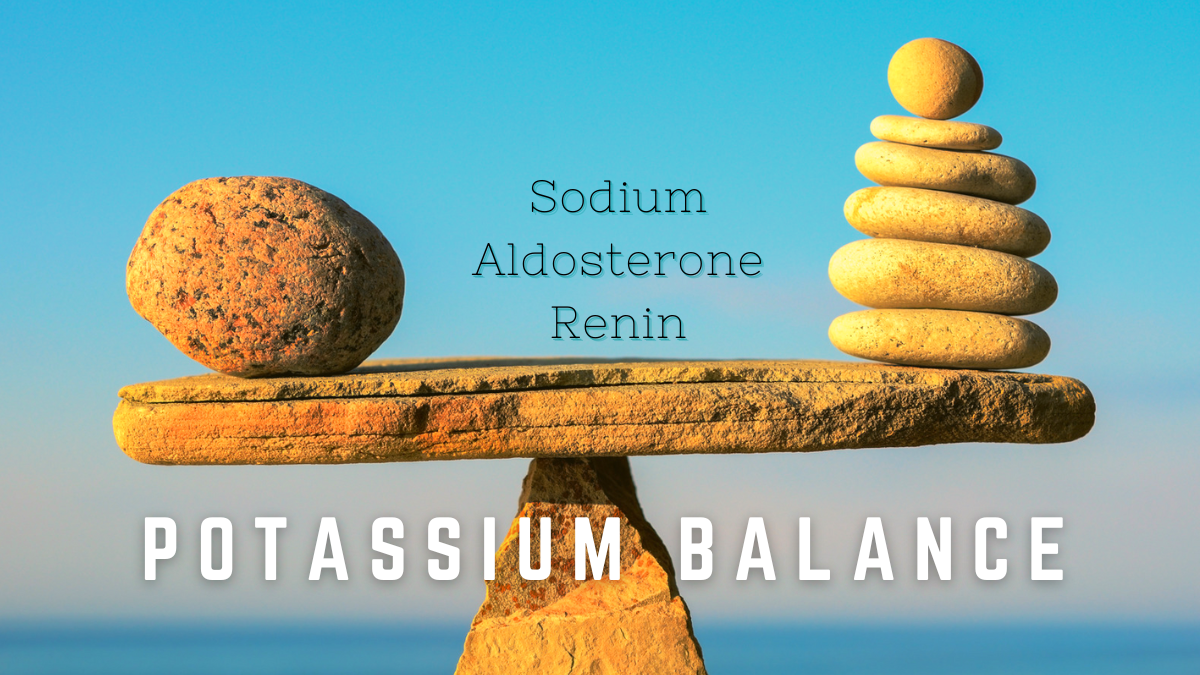The balance of potassium in the body is under the influence of several factors. I reviewed the impact of both insulin and adrenaline in this previous post. Today, I looking at some other factors that influence potassium.
Today’s journal club article, is an older study that intensively studied high potassium doses on healthy subjects. The examined how high potassium intake impacts:
- Urinary potassium excretion
- Urinary sodium excretion
- Plasma potassium
- Aldosterone and Plasma renin activity.
What did they do?
The researchers took 6 healthy volunteers and feed them a diet containing 2300mg of sodium (100mmol) and 3900mg of potassium (100mmol). After the subjects had reached equilibrium, potassium intake was increased to 15,600mg (400mmol) of potassium for 20 days using potassium chloride supplements.
What did they find?
Urinary potassium excretion: At baseline urinary potassium excretion accounted for ~75% of intake. When potassium intake increased, so did the urinary potassium excretion, reaching a high level of ~95% of intake.
Urinary sodium excretion: Initially, increasing the potassium intake resulted in increased urinary sodium excretion. After 72 hours, the body appeared to get used to this higher potassium intake and the urinary sodium excretion decreased.
Plasma Potassium: The plasma potassium increased and was highest after 72 hours. It did go down a little bit, but did not return to baseline until participants resumed their regular diets. Of note, no one developed hyperkalemia though this isn’t surprising as these people had normal kidney function. The mean change in plasma potassium from baseline to 72 hours was 1.02mmol/L.
Aldosterone and Plasma Renin Activity: Aldosterone and renin activity both increased with increased potassium intake. However, both returned to baseline values within the 20 day test period.
What does this mean?
This article shows that high amounts of potassium chloride are associated with increases in plasma potassium values. These values remained higher than baseline for the entire time that the potassium chloride was consumed. That being said, the potassium values remained within the normal range, which demonstrates that healthy kidneys are able to adapt to high potassium loads within a relatively short time (20 days).
What this article tells us?
Urinary potassium and sodium excretion are related. Changes in intake in one mineral likely impact excretion of the other. This could be important when looking at published literature that uses urinary potassium as a marker of dietary intake. Has the article considered how sodium intake could be impacting potassium intake? If not, the article may not be interpreting their data correctly.
Aldosterone and renin are also involved in potassium balance. Alterations in these systems, by either medications or medical conditions, could impact the body’s ability to compensate for higher potassium loads.
What this article doesn’t tell us?
Because the potassium was added using potassium chloride supplements, it doesn’t tell us how high doses of potassium from food will behave in the body. It is possible that concentrated, highly bioavailable sources of potassium from potassium salts behave differently than potassium found naturally in foods.
This article also doesn’t tell us what would happen for those living with kidney disease. Though one could hypothesize that those with kidney disease may not be able to metabolically compensate for such high potassium doses by increasing renal potassium clearance.
Take Aways
High potassium doses, from potassium chloride supplements, are associated with significant increases in plasma potassium levels. Potassium balance is impacted by sodium, aldosterone and renin. Changes in dietary intake of potassium and sodium will impact urinary excretion of both minerals. Aldosterone and renin are also involved in potassium balance and changes in these hormones may also impact potassium balance.



